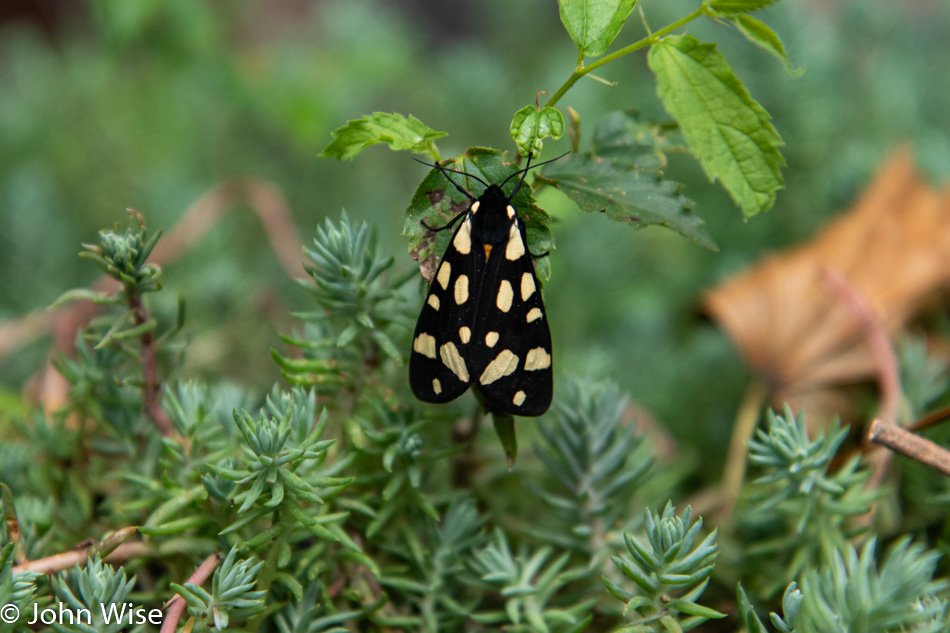
Being in the moment of here and now instead of dwelling in our past or not projecting ourselves into the future seems to be a great difficulty for the majority of people, at least as far as I can tell. This is easily observable of people in quiet places while in nature, where instead of listening to the sounds of their environment, they quickly have to fill their place in silence with their own sounds. Could it be that silence is being equated with boredom and that adding a human voice convinces them that something meaningful is happening?
My moments of staring at swirling reflections on the surface of water do not offer me insights or conversation. I do not try to understand the mathematics of the hydrological function or fluid dynamics that are part of the equation found in the movement of that water. On the contrary, I find my mind relatively quiet with my eyes intently focused on capturing the complex interplay of light and reflection while my ears attempt to hear the soft movements of water that, while not turbulent, their subtle perturbations gently bump into the soundscape offering a nuanced element to the environment.
As the wind rustles the grass and a spider descends from a tree, a damselfly skims the surface of the transparent waters, and life tries to show its equilibrium. I only have brief moments to find myself in symbiosis with my world before either I distract myself or someone else drags me out of my connectedness. The difference is that my distraction comes from my peripheral vision, where something else worth falling into competes for the award of being more spectacular, as opposed to the other person who intrudes, breaking the trance by telling all of those in earshot about how they slept last night.
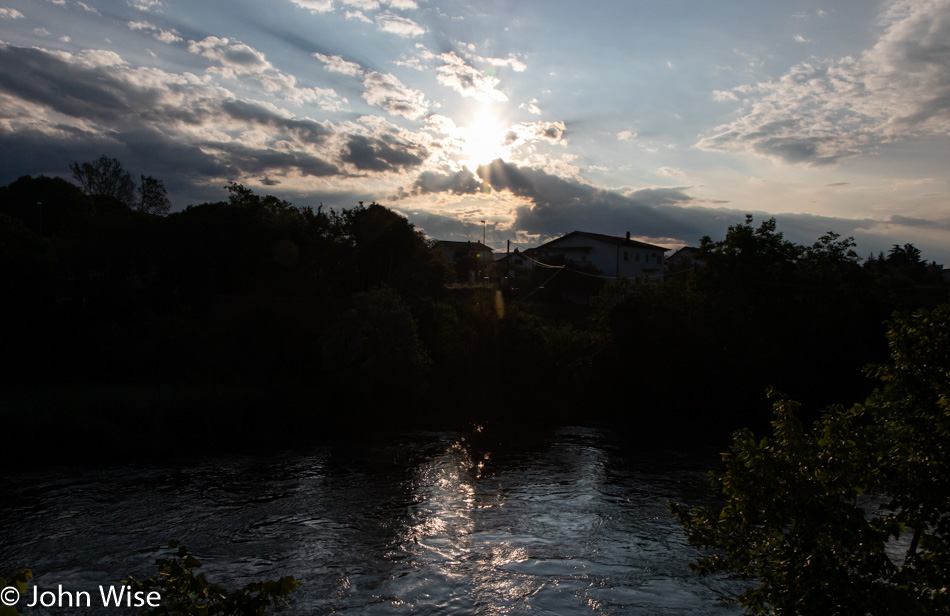
Caroline and I know what it is to swim in the Trebižat River as we flipped our kayak in a small rapid. Exhilarating adrenaline is the first thing to strike even before I know exactly where I’m at. Caroline was able to grab hold of the kayak and both paddles while Ivan reminded me to snap out of my panic. Hearing his voice, I was able to stop fighting my situation and let my feet float in front of me, getting my bearings by doing so. With me under control, he told Caroline to let go of the kayak and swim to shore and then told me to do the same. In a few moments, we were standing waist-deep in the reeds, waiting for Matt and Don to be plucked from the river.
Those two had flipped just before we did, and while they were trying to make their way back onto their kayak, Caroline was encouraged to swim to the other side of the river, where it would be easier to get ashore. I held onto the back of Bruce and Echo’s canoe and was pulled across the river as I wasn’t as comfortable swimming in the strong current. Caroline and I ended up hitchhiking with Dean and Jerry’s canoe pretty quickly while Matt and Dan wrestled with our kayak that was passed on to them as their kayak was still being pursued downriver. As quickly as Matt and Don were on our kayak, they were just as quickly flipping again, this time in relatively calm water.
Caroline and I wrestle with control of two-person kayaks at the best of times, and while we were going down the Trebižat, I had to insist on control of our kayak as it was acting squirrely. I don’t believe Caroline or the boatmen thought I was serious about kayak issues and likely thought it was simply operator error. After Matt and Don were spilled out again, Ivan had them transferred to another canoe and worked on recovering our forlorn kayak, which now listing in the water at an almost 45-degree angle – the kayak’s hollow hull had been taking on water, making it unwieldy, which is also why it flipped so easily in a minor rapid. I felt vindicated.
A few minutes later, the four of us soaked swimmers were dropped at the shore for a short walk along the riverside trail back to the hotel. Shivering wildly, I was ready for the hot shower that brought me out of the cold, and then it was time for a lunchtime feast, followed by the inevitable drive to our next location.
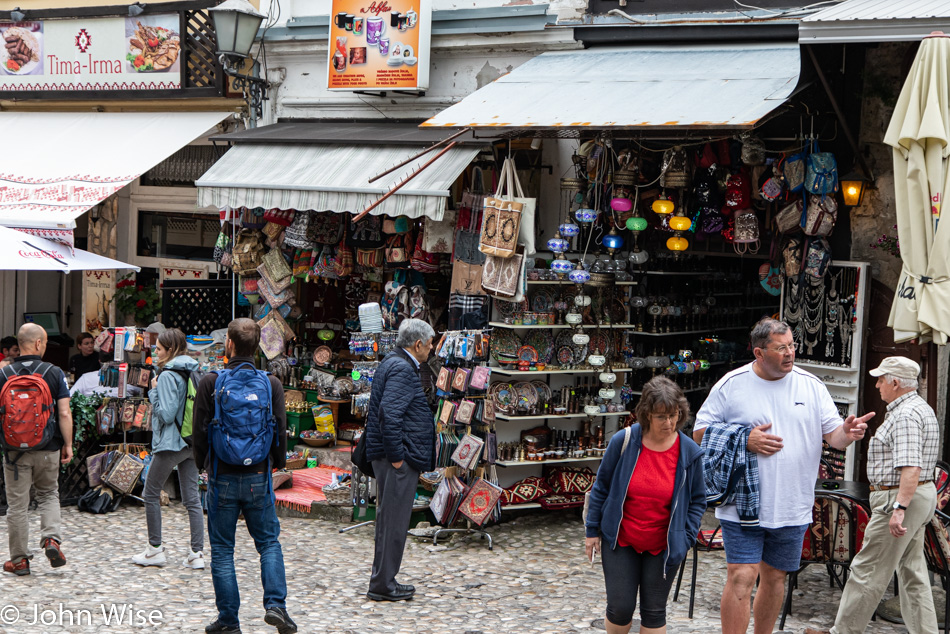
Welcome to Mostar, Bosnia and Herzegovina.

Mostar was experienced under gray skies that can hardly be dark enough to convey a fraction of the misery that was going on here in the Balkans around 25 years ago. The bridge on the left, called Stari Most (“Old Bridge”), is not the original as that old one was blown to oblivion after having stood over the Neretva River for 427 years. Back on the 9th of November in 1993, the war in the Balkans claimed this important relic of antiquity as one of its many victims.
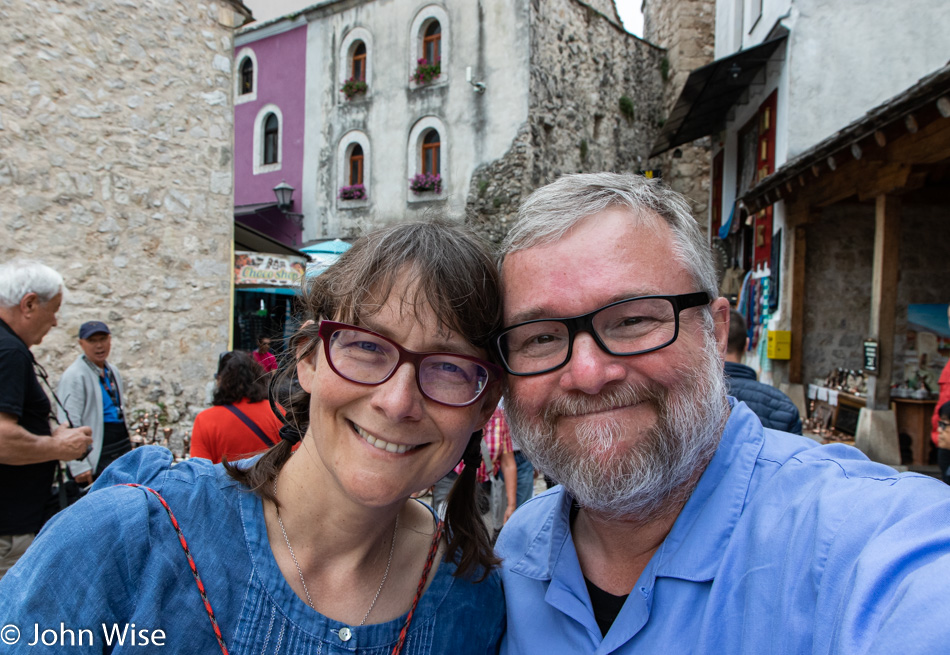
With only one hour here, it’s like we are racing the time gauntlet, but the truth of this small village is quickly apparent: if your time is limited, it will appear you are in a shopping district of trinkets. Of course, there is probably much more to Mostar than some tourist stalls in the bazaar, but how does one visit the Koski Mehmed Paša Mosque and whatever else might be here besides the bridge when you are running out of time so quickly?
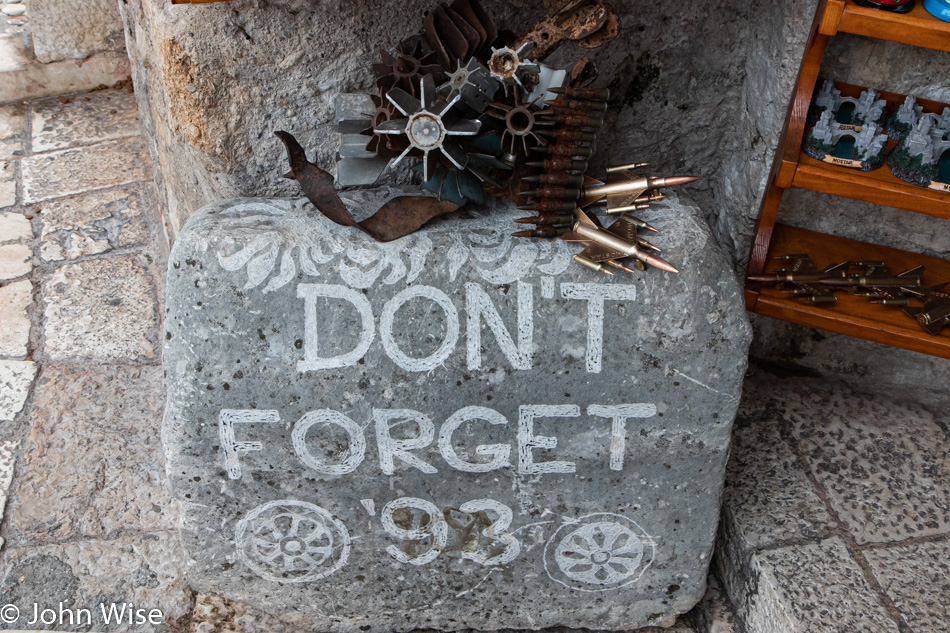
The fateful year that hatred changed a relationship. In our experiences so far, there is no visible evidence of racial or religious segregation between the various peoples of the Balkans. On the contrary, we’ve not been warned to stay away from any areas in the stops we’ve made. In the states, there are skidrows, gang areas, and highly segregated neighborhoods that are potentially dangerous to the lives of outsiders. We have walked among Muslims, Catholics, and Christians while not once witnessing or sensing any friction among people as we do in many inner-city places back home.
If there are frictions between people, it is likely created the levels of government where radicalized politicians with foreign backing are being used as pawns to manage conflict and help exploit resources in an effort to depress regional economies, preventing them from enjoying the benefits of prosperity that might draw resources away from the major powers. People we spoke to told us they are worried that tensions are rising again within Bosnia and Herzegovina as the country is separating into different areas. Also of concern is the relationship between Serbia and Kosovo, which is based on unresolved issues. They fear that conflict flaring up in one area could spill into other Balkan countries, dragging the region back into war. So the admonition “Don’t Forget” is a reality that is not merely a slogan but a wish for a future free of death and destruction of those things people hold close to their hearts.
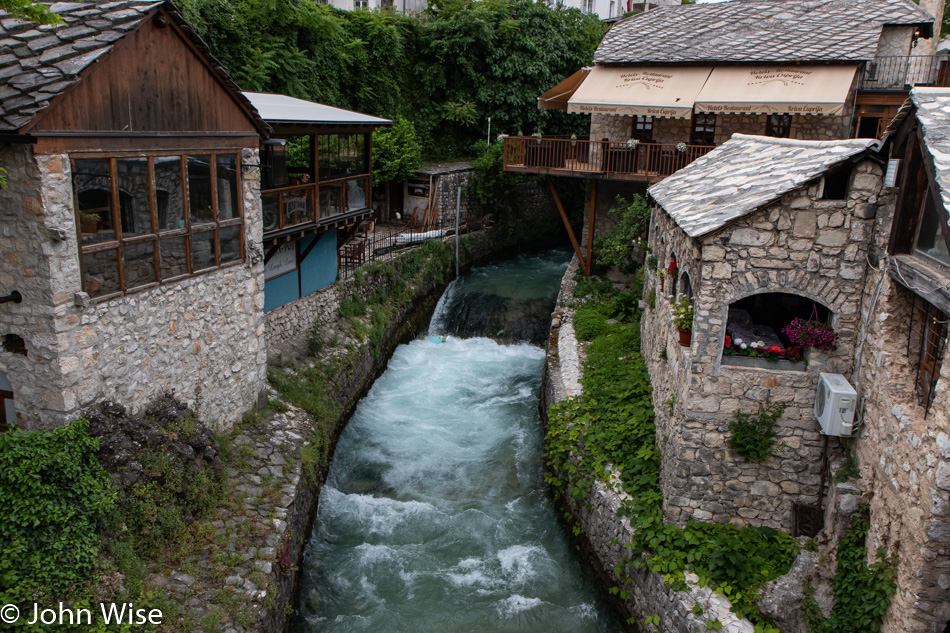
The postcard views of this city are many and found nearly around every corner. The hints of the cultural and architectural history that we are able to grab onto during these brief encounters will likely work on us well into the months following our visit to draw us back for a more in-depth immersion in the lands and with the people of the Balkans.
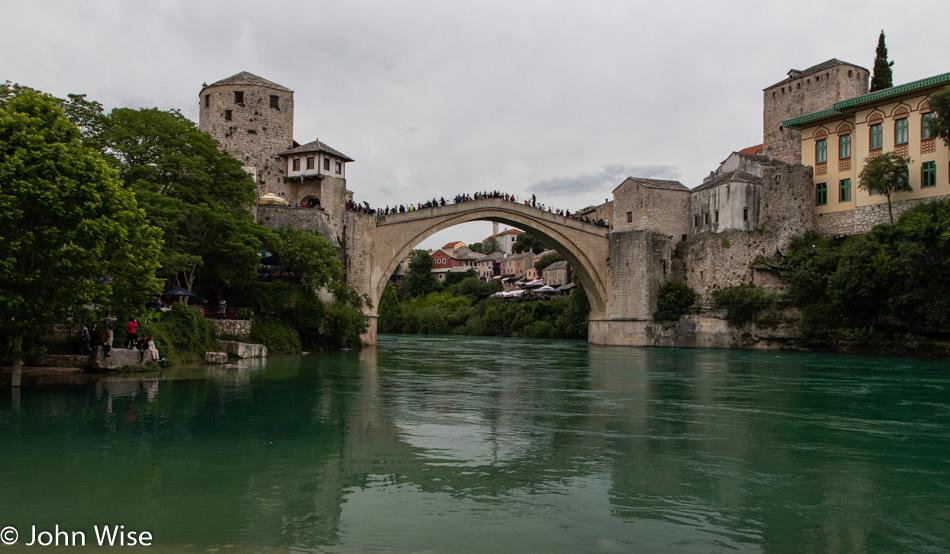
We avoid the stress of trying to see it all by simply focusing on the Stari Most and letting this central icon of this old city work on fixing a place in our memories.
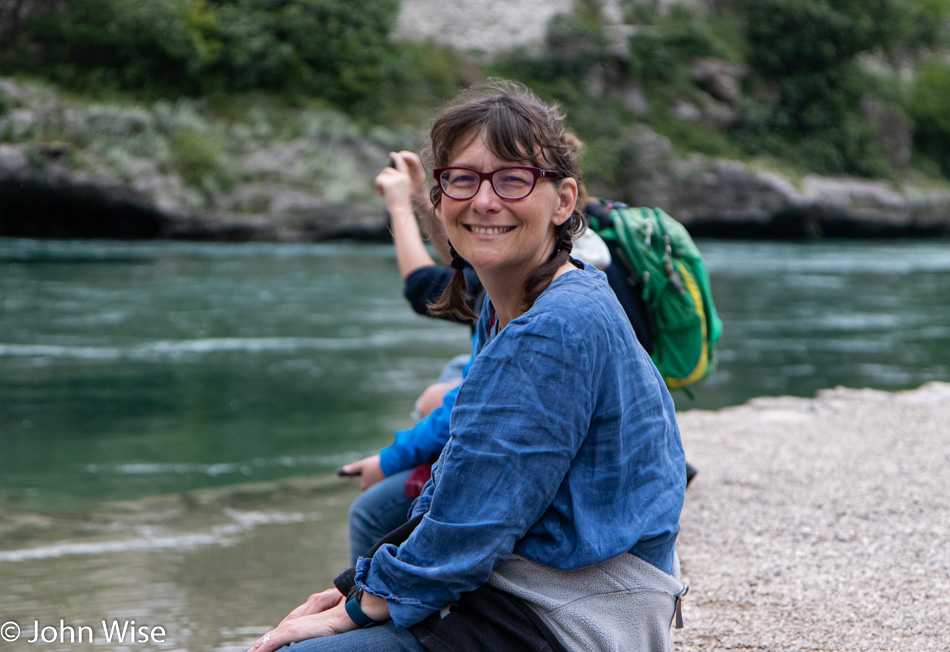
I do have a photo of Caroline standing in the Neretva River with the bridge as a background but this one riverside with my wife’s smile reflecting what looks like happy to me is the one that felt appropriate to end our encounter with Mostar today.
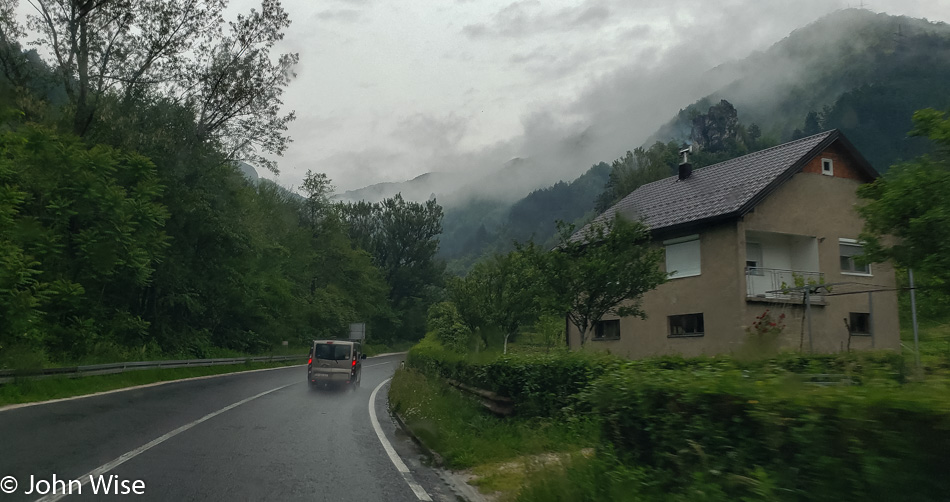
Heading down the road to Sarajevo.
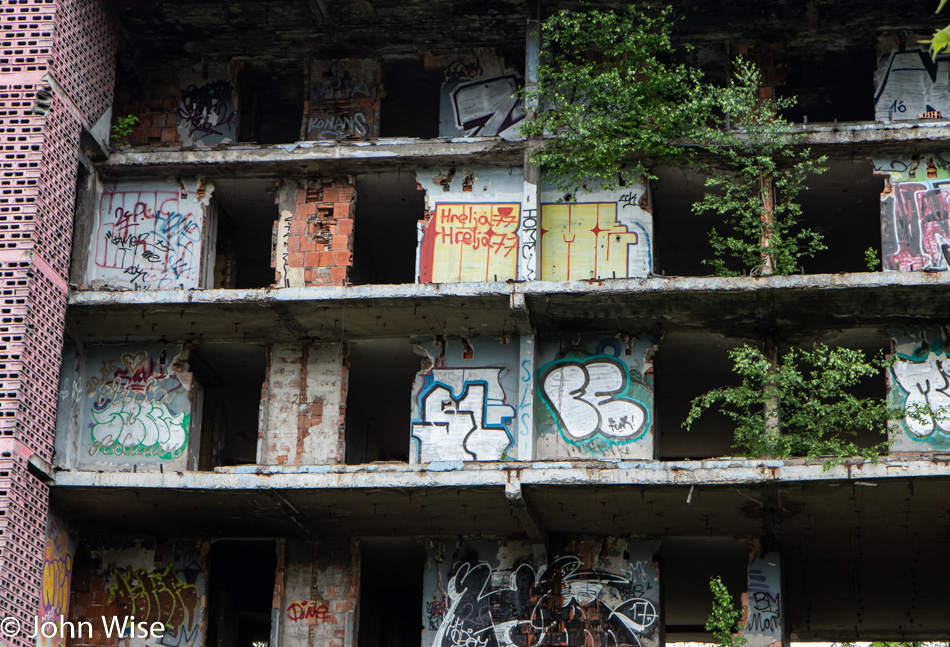
Sarajevo was hammered back in the day. I was living in Frankfurt, Germany, while the core of the conflict was underway, and it was this capital city of Bosnia and Herzegovina that was most often in the news. Of course, the atrocities and war crimes committed elsewhere punctuated the reporting of destruction, but maybe because of an affinity for Sarajevo due to its hosting of the 1984 Winter Olympics put it into the consciousness of people as being the one place in the Balkans that people from the West knew.
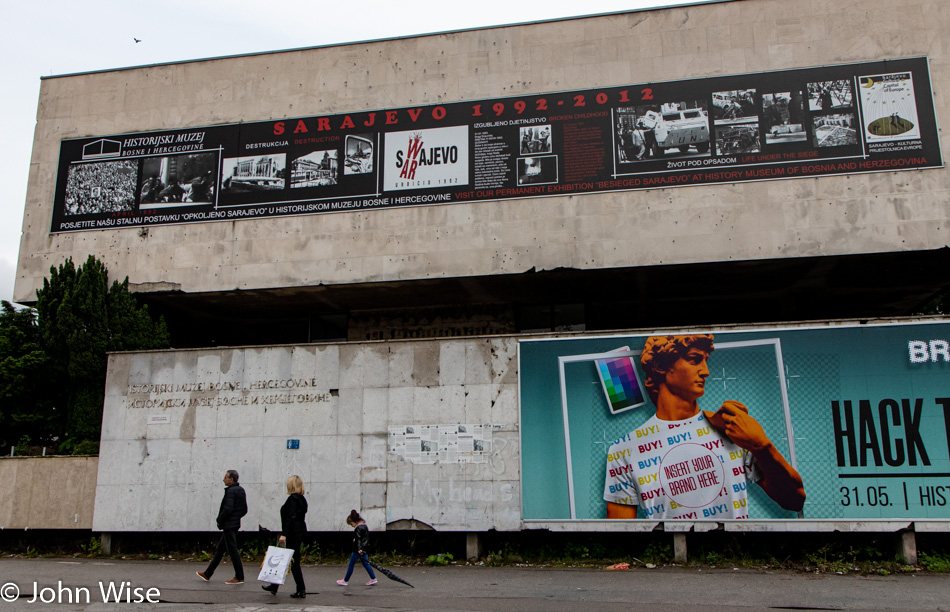
Driving into this city, it is instantly apparent that the economy is not flourishing. This is not like other capitals found in Europe, where its wealth is on display and easily seen. The overcast pallor of the sky is likely adding to the dour look of things, though I’m leaning more toward the idea that this region of the Balkans has been having difficulty recovering.
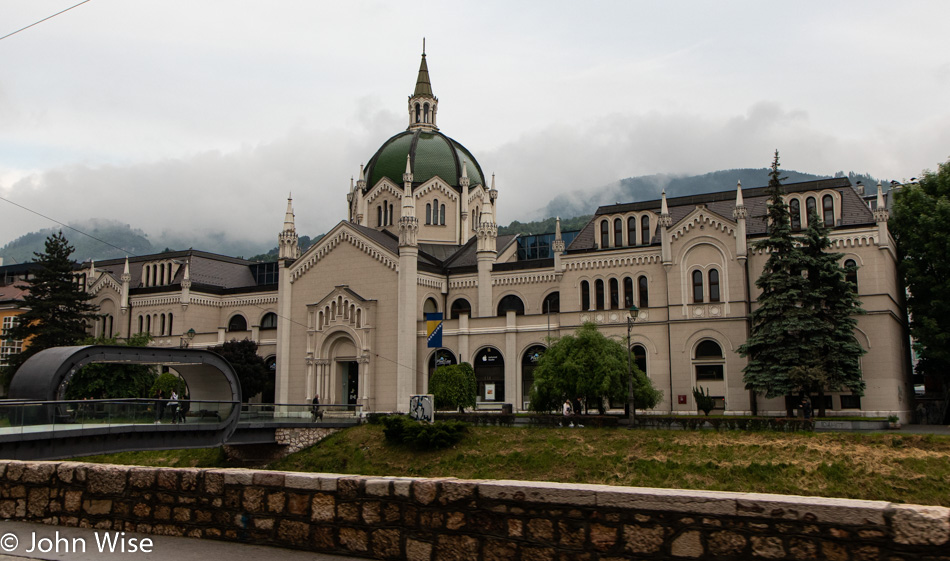
Signs in the main downtown core show what efforts have been made to revitalize an area that was under siege barely more than 20 years ago. These were the impressions made from our van as we drove through the maze of Sarajevo, looking for our hotel. Tomorrow, we’ll have a good amount of time to properly visit this city, unlike the mere hour earlier in the day given to Mostar.
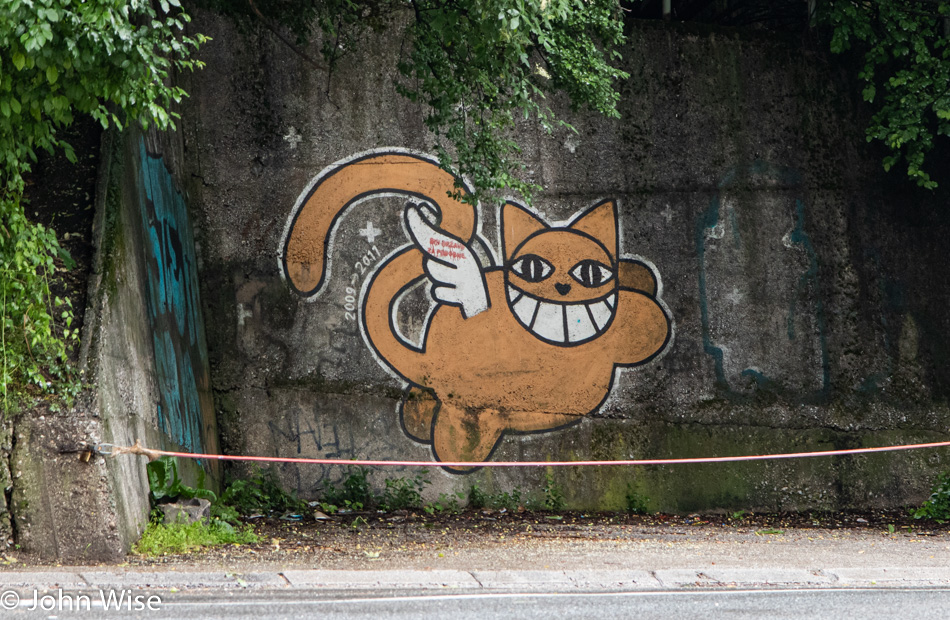
Monsieur Chat, originally created in Orléans, France, in 1997 by artist Thoma Vuille, has been making appearances around the world, including sightings here in Sarajevo. The second Caroline saw it, she asked that I take a photo for her.
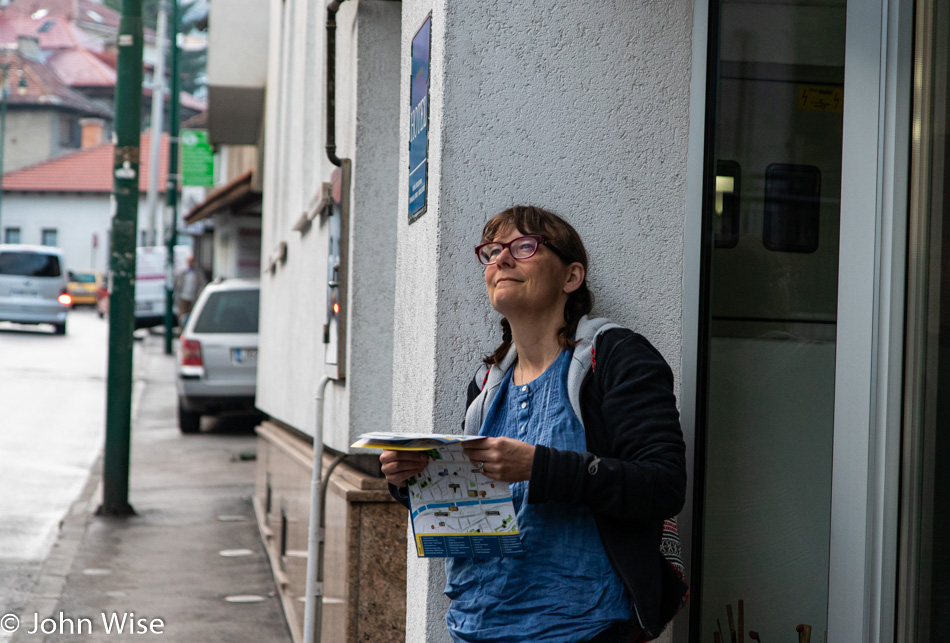
Caroline is ready to go out and explore but first, we wait for the rest of the group as we are on our way to dinner. Speaking of this evening’s ritual, our meal will be taken at Žara iz duvara, also known as The Singing Nettle.
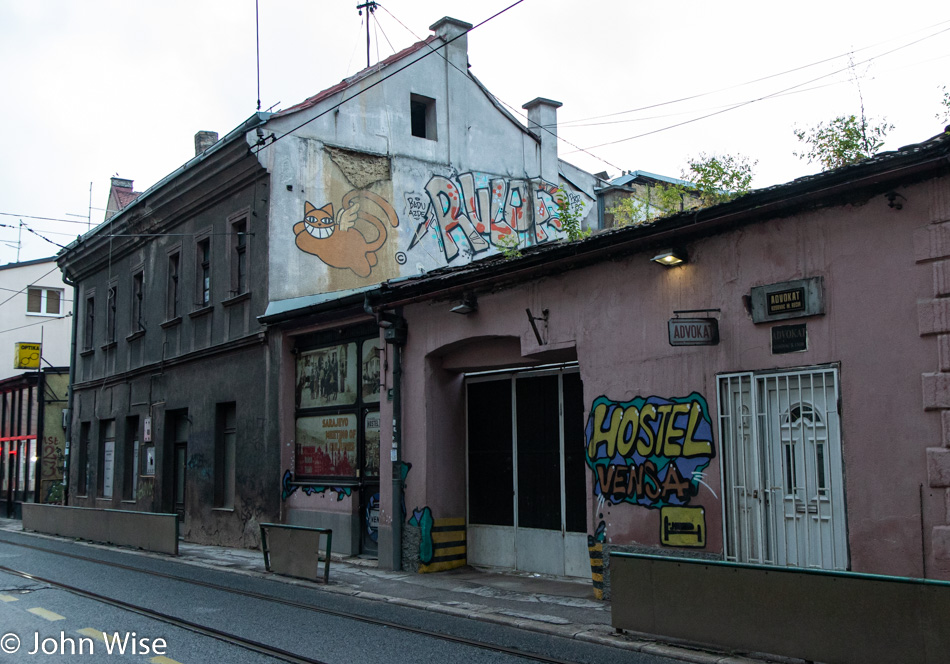
Monsieur Chat is again looking over the city.
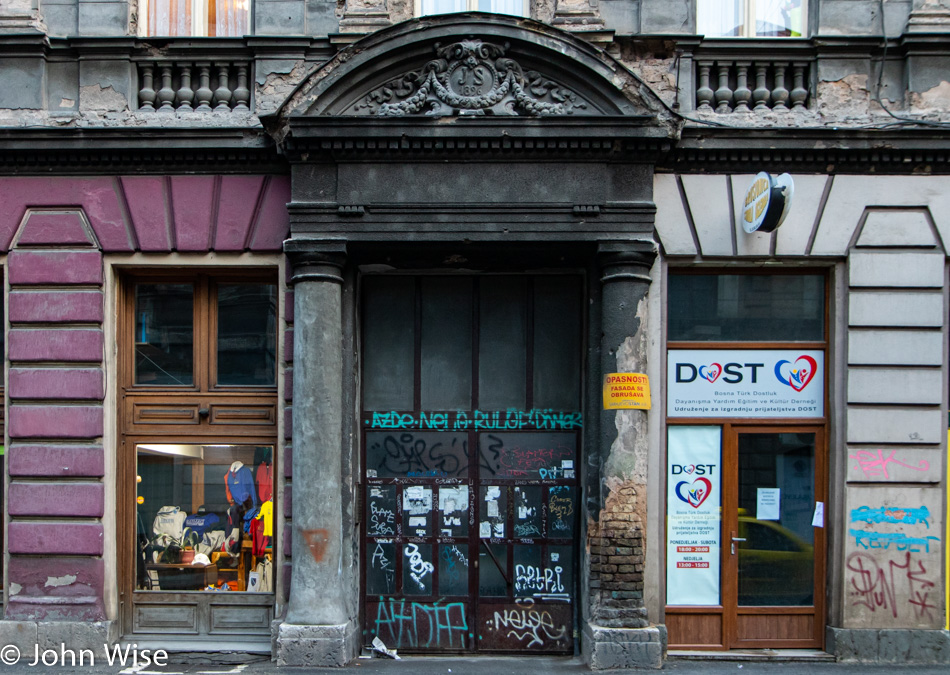
There’s something reminiscent of Los Angeles in the late 1970s to me, which is the city I grew up in. On days my parents were working a convenient shift that would allow me to head downtown, I’d take the bus about 25 miles west of where we lived so I could head into the sketchy underbelly of the city of high rises that enchanted me and drew me in. Walking through Skidrow as a 14-year-old boy with my black-and-white camera, I felt as though I was seeing real life instead of the suburban bullshit I was being told was normal. Grit and grime were my normal. I wanted to see winos, hookers, homeless people with missing teeth, eyes, feet, or bulges showing through their clothes that portended wicked diseases I couldn’t imagine. I smelled people that were rotting, just like the streets they were living on. That’s the sense of feeling I have here in Sarajevo. All of the shine and superficial grandeur is temporarily missing as the city works to find its glory days, but until then, we get to witness the decay that cannot be hidden. Sadly, this place may never really recover as its population is still being decimated due to high unemployment and investment dollars not readily flowing into Bosnia. Back when I was growing up in L.A., it was still a city that attracted people from all over the world who wanted to be in the movies, sing in a band, or sell drugs to the rich and famous. I don’t think any of that exists here in Sarajevo. Those who can leave to work elsewhere – in Croatia, for example.
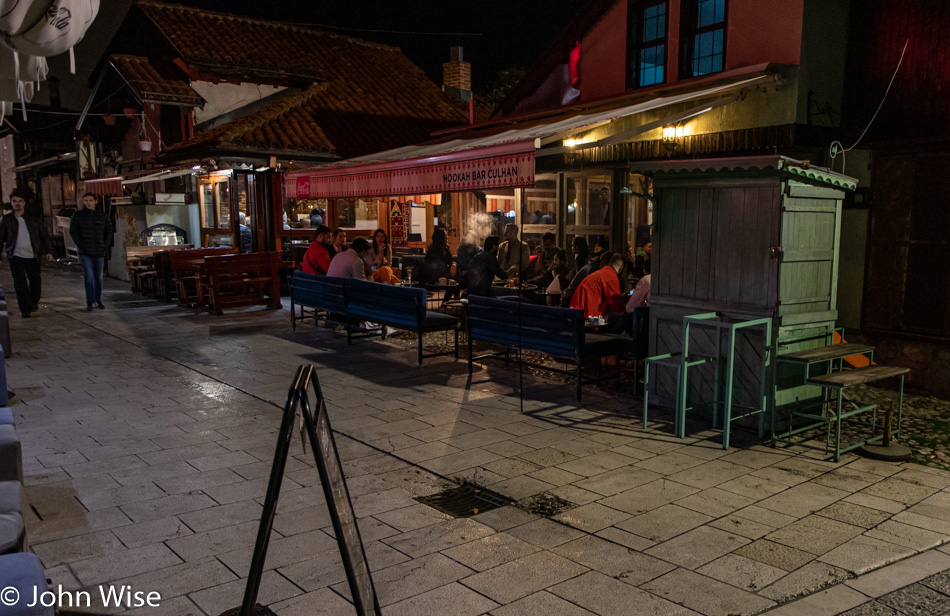
Dinner tonight was spectacular, and rightfully so, as The Singing Nettle is one of the highest-rated restaurants for traditional Bosnian food. While we were once again eating from a prearranged menu, the offerings were seriously good. Sure, Caroline and I would have gladly tried the tripe with nettles and the veal tongue with nettles but we understood that besides our river guides, we’d have probably been alone in our enthusiasm to try the more exotic flavors of Bosnia. Cinnamon-flavored goulash called Papaz ćevab, dolmas, meatballs, and boiled potatoes with nettle-garlic sauce sufficed and satisfied. This restaurant would be at the top of my list should we find our way into the Balkans again.
After dinner, it appeared the rest of our travel companions went back to the hotel; we had other plans. No, we didn’t stop in this hookah bar for some shisha, though it does look like a great place to hang out if the tobacco smoke doesn’t bother you. There were many hookah lounges along the way as we wandered the narrow streets, looking for whatever might present itself.
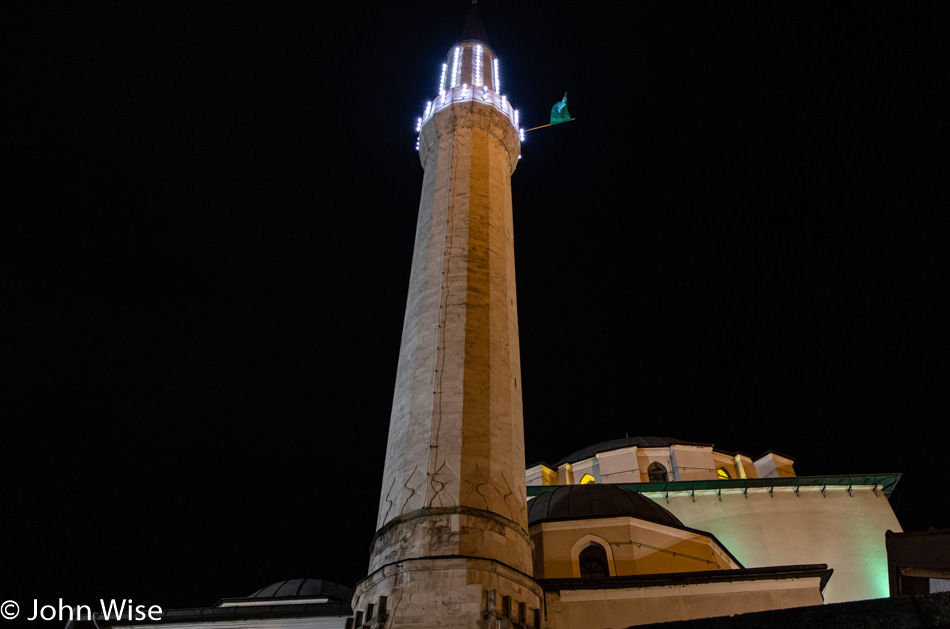
The call to evening prayers by a nearby Mosque is what immediately begged for attention, and so we made our way towards the minaret.
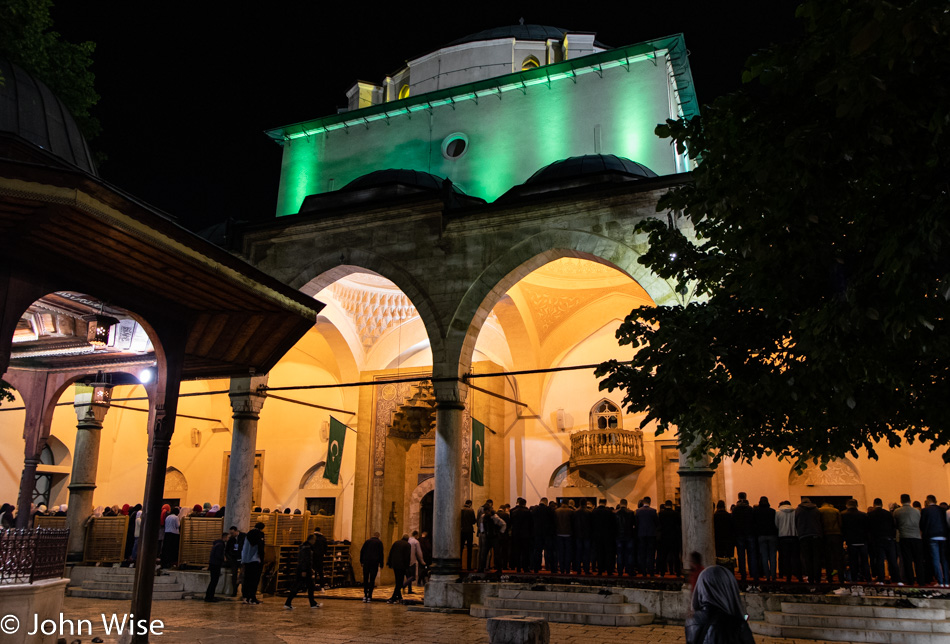
Arriving at the Gazi Husrev-beg Mosque, we were uncertain when approaching if we could just enter, so we watched through the side door to see how other visitors who might not be of the Muslim faith were conducting themselves. After we felt comfortable that we wouldn’t embarrass ourselves, we entered the grounds and took a position well behind the worshippers all facing towards Mecca in Saudi Arabia. We felt honored to be present as obvious outsiders who were voyeurs upon a religion we know relatively little about. Listening to the prayers led by the Imam was a beautiful experience that was as touching as any Christian church we’ve visited prior to this, our very first encounter with a Mosque. Watching these men and women prostate in devotion before God at 10:30 at night is certainly worthy of our respect, even though I’m in conflict regarding organized religion of all denominations. The politics of forced customs is beyond the scope and time I have right now for this blog entry, but if I had to take umbrage with any belief system, I have enough disdain for all of them to such an extent that I couldn’t isolate only one of them for my lament.